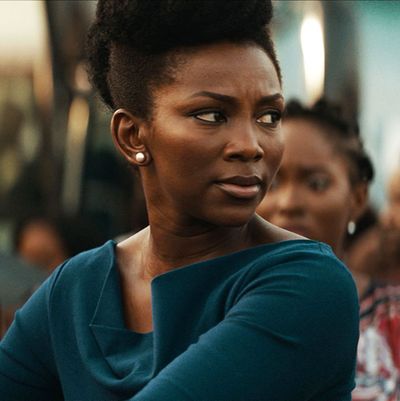
Recent awards seasons have seen the addition of a new yearly ritual to the Oscars calendar. Just as prognosticators spend the summer trying to forecast each year’s contenders and the early September festival season figuring out which ones truly have the goods, the fall now also brings the eagerly awaited appearance of the Academy’s first totally avoidable, self-inflicted controversy. In its quest to combat falling TV ratings — which aren’t, in the scheme of things, actually that bad — the Academy has attempted to shake up the Oscars ceremony with changes both big (the introduction of a Popular Film category) and small (the relegation of certain categories to commercial breaks). No matter their size, these ideas usually result in everyone getting even madder at the Academy than they were before, at which point the changes are dutifully rescinded. Undaunted, the Academy goes back to the lab, in search of the idea that, this time, it’s sure will be the one that saves the Oscars.
Compared to what’s come before, this year’s innovation was on the minor side: The Best Foreign Language Film Award was renamed Best International Feature Film. However, the switch now appears as equally ill-thought-out as its predecessors. While the category’s title changed, none of its rules did — only films in a language other than English are allowed to compete. Since “foreign language” and “international” are not synonyms, you might have predicted what happened next: Nigeria’s official Oscar submission Lionheart was denied entry on the grounds that, while it is an international film, it is not a foreign-language film. (The film’s dialogue is mostly in English, with portions in Igbo.)
Films like Lionheart have always been barred from entry in this category, but at least the reason for their disqualification was right there in the title: They weren’t foreign-language films. Now, with the new title change, fans are understandably confused and upset when an international film is told it is not the right kind of international film for the Best International Film Oscar. “English is the official language of Nigeria,” Ava DuVernay noted on Twitter, asking the Academy, “Are you barring this country from ever competing for an Oscar in its official language?” Lionheart director and star Genevieve Nnaji spoke up for her film as well: “This movie represents the way we speak as Nigerians. This includes English which acts as a bridge between the 500+ languages spoken in our country … We did not choose who colonized us.”
Since its introduction in the 1950s, the Academy’s foreign-film award has been a strange category. For one, the trophy is officially handed not to a film’s director or producers, but to the country that submitted it. Accordingly, each country is only allowed to submit one film. (We’ve seen great movies like The Handmaiden and Portrait of a Lady on Fire lose out after being snubbed by their national film boards.) From the very beginning, it has been open only to films outside the English language, a rule that in its majestic equality excludes films from the U.K., Canada, Ireland, Australia, New Zealand, Botswana, Fiji, and Zimbabwe alike. However, films from these countries have occasionally managed to sneak in. A handful of Québécois efforts have earned nominations for Canada over the years, with The Barbarian Invasions taking home the trophy in 2003, while Water, a Hindi-language film set in India but made by Canadians, got a nod three years later. Two British movies were nominated in the ’90s; they were both in Welsh. Meanwhile The Square, a Danish film with significant amounts of English dialogue, managed a nomination in 2018, as it fit under the threshold of being “predominantly” in antother language
So the Lionheart decision is not exactly a surprise, but I get the sense that it would not sting so much were it not for the fact that the Oscar meant to celebrate the best international cinema often winds up overlooking large parts of the world. The trophy has gone to a European country 83 percent of the time, a ratio even the most Fellini-adoring cinephiles might admit is a little overboard. Only three films submitted by African countries have ever won, and that number should probably come with an asterisk. The first, 1969’s Z, is a justly canonized thriller, but though the film was shot in Algeria, it was directed by Greek filmmaker Costa-Gavras and its plot is a loosely fictionalized retelling of Greece’s political turmoil. The second, 1976’s Black and White in Color, is a World War I satire about white colonists in West Africa that won the Oscar on behalf of the Ivory Coast; it was made by Frenchman Jean-Jacques Annaud. South Africa’s Tsotsi, directed by Gavin Hood, is the only film by an African director to win the foreign-language Oscar.
Unlike its other missteps, it does not seem clear that the Academy simply undoing the name change would quell the controversy here. It has introduced a conundrum with no easy answers: Is there a way to open up the Oscars field to films like Lionheart in a way that would protect subtitled cinema from being swamped by the likes of The Full Monty? On Twitter, director Lulu Wang raised similar questions: “Can a ‘foreign film’ be in OUR language (i.e. English)? Can a domestic (i.e American) film be in a foreign language? What does it mean to be foreign? And to be American?” For Wang, the issue is more than academic. Her film The Farewell, an American movie mostly in Mandarin, is ineligible for Best International Film at the Oscars. Meanwhile, at the Golden Globes, The Farewell is ineligible for Best Musical/Comedy — because it’s a foreign-language film.


